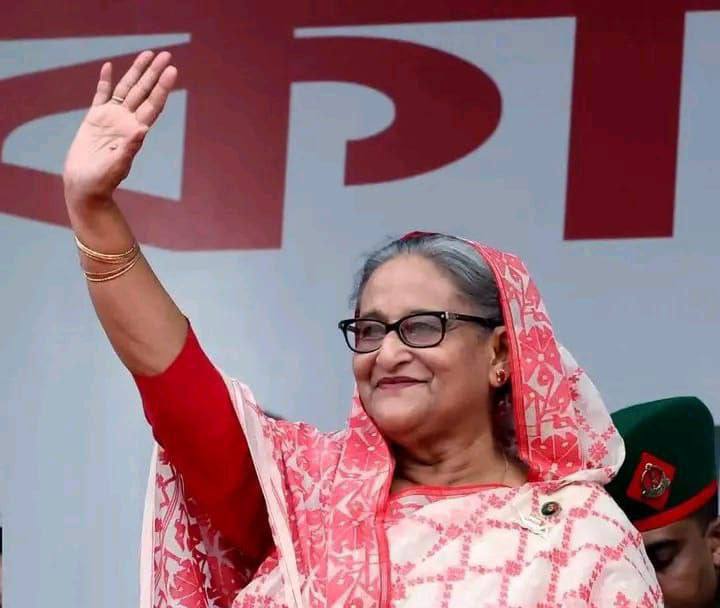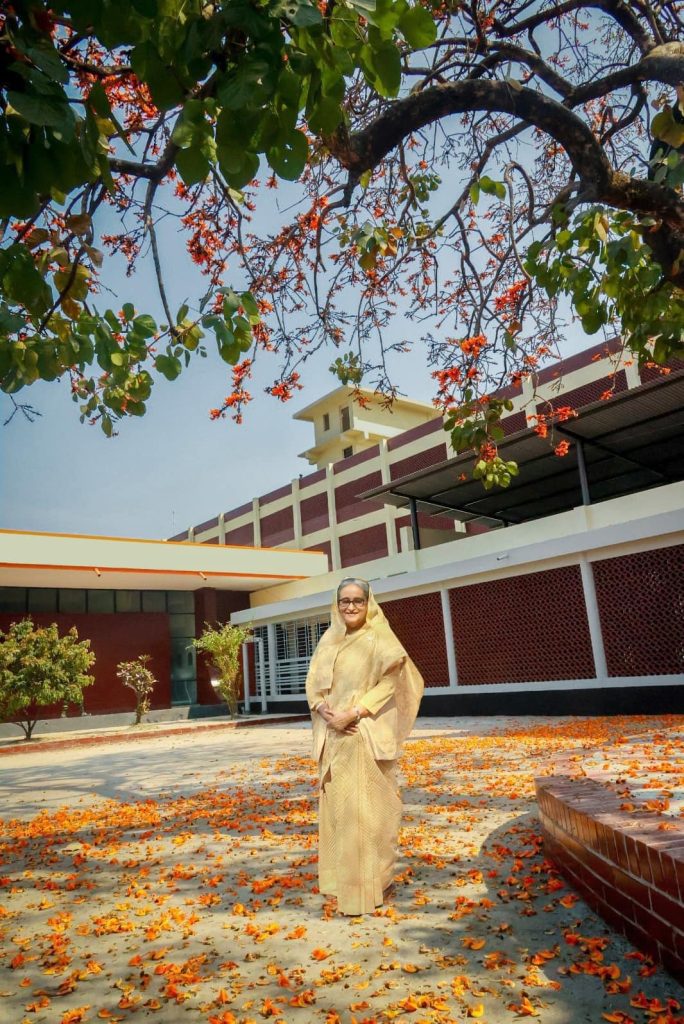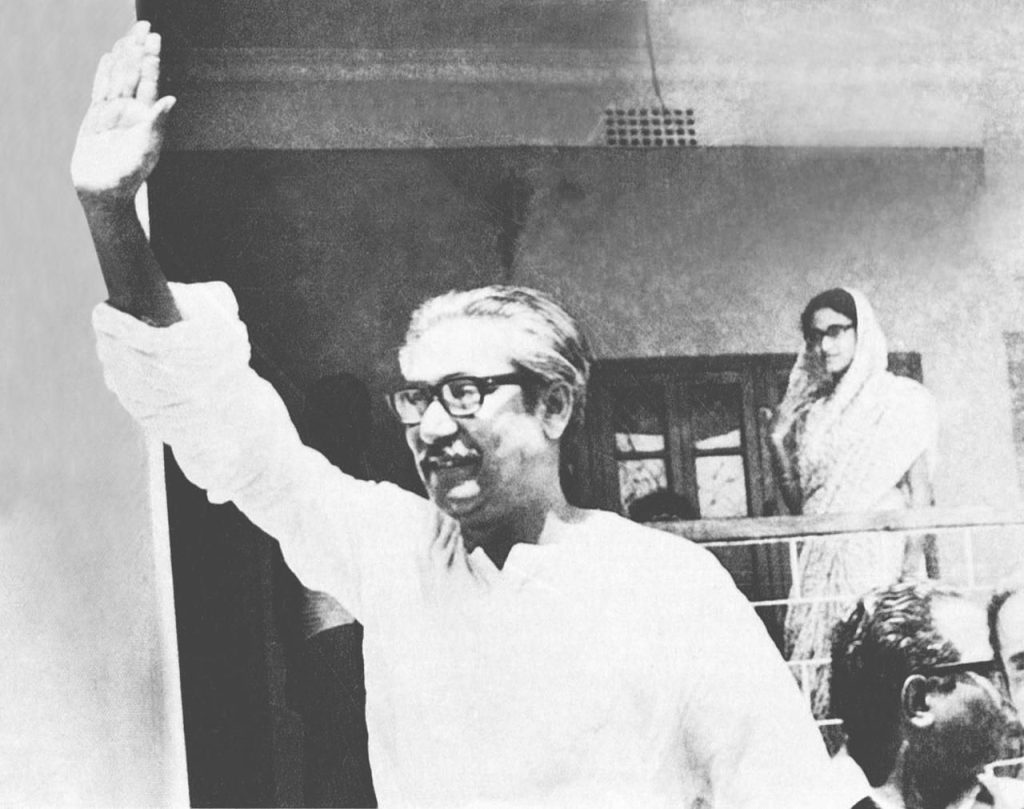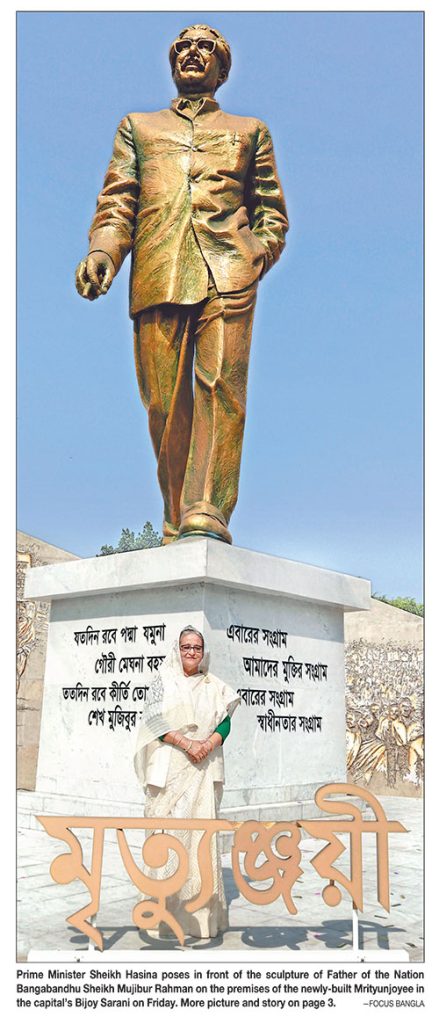The indomitable leader of the Bangladesh Awami League, Sheikh Hasina, stands as a towering figure in the history of Bangladesh. As the daughter of Bangabandhu Sheikh Mujibur Rahman, the founding father of the nation, she inherited not only a legacy of sacrifice and struggle but also an unwavering commitment to the ideals of justice, secularism, and progress.

For over four decades, since assuming the leadership of the Awami League in 1981, Sheikh Hasina has guided Bangladesh through turbulent times, transforming it into a nation of resilience, growth, and global recognition. A five-time Prime Minister, her visionary leadership, intellectual acumen, and unrelenting dedication have redefined Bangladesh’s trajectory, making her one of the most influential leaders of the modern era.
A legacy rooted in sacrifice
Born on September 28, 1947, in Tungipara, Gopalganj, Sheikh Hasina’s life was shaped by the turbulent yet inspiring journey of Bangladesh’s struggle for independence. As the eldest daughter of Bangabandhu Sheikh Mujibur Rahman, she grew up in a household where the seeds of liberation, equality, and justice were sown. The tragic assassination of her father and most of her family in 1975 was a personal and national catastrophe that could have broken a lesser spirit.
Sheikh Hasina reflects on her achievements, condemns rising poverty and violence
Sheikh Hasina greets Hindus on Durga Puja
Yet, Sheikh Hasina emerged from this unimaginable loss with a resolve to carry forward her father’s dream of a “Sonar Bangla” (Golden Bengal). Exiled and targeted, she faced immense personal risk, yet her courage never wavered. Returning to Bangladesh in 1981, she took on the leadership of the Awami League, a party founded on the principles of democracy and secularism and began her lifelong mission to rebuild a fractured nation.
A visionary leader
Sheikh Hasina’s leadership of the Awami League since 1981 has been nothing short of transformative. At a time when the party was grappling with internal divisions and external threats, she unified its ranks, revitalised its spirit, and restored its position as Bangladesh’s largest and most influential political force.

Her ability to connect with the masses, coupled with her strategic foresight, turned the Awami League into a formidable platform for advocating social justice, economic development, and inclusive governance. Under her stewardship, the party has remained steadfast in its commitment to secularism, ensuring that Bangladesh’s diverse communities—Muslims, Hindus, Buddhists, Christians, and others—coexist in harmony.
Sheikh Hasina: Islam is not safe in the hands of Yunus-Jamaat clique
Will raise victory flag from the ruins of Dhanmondi 32 once again, says Sheikh Hasina
Her leadership style is a blend of pragmatism and idealism. She has consistently championed policies that uplift the marginalised, empower women, and promote education, while navigating the complex socio-political landscape of Bangladesh. Her ability to balance tradition with modernity has made her a unifying figure, earning her the respect of both rural communities and urban elites.
Five-Term Prime Minister: A record of resilience
Sheikh Hasina’s tenure as Prime Minister—first from 1996 to 2001 and then continuously from 2009 to 2024—marks her as one of the longest-serving female heads of government in the world. Her five terms in office reflect not only her political acumen but also the trust that the people of Bangladesh have placed in her leadership. Each term has been defined by bold initiatives, transformative policies, and an unwavering focus on national development.

Her first term (1996–2001) laid the groundwork for economic liberalisation and social progress. Initiatives like the Ganges Water Sharing Treaty with India demonstrated her diplomatic prowess, while domestic policies focused on poverty alleviation and infrastructure development set the stage for future growth. When she returned to power in 2009, Bangladesh was grappling with economic challenges, political instability, and the lingering effects of military rule. Undeterred, Sheikh Hasina embarked on an ambitious agenda to modernise the nation, prioritising economic growth, digital innovation, and social equity.
Transforming Bangladesh: A legacy of development
Under Sheikh Hasina’s leadership, Bangladesh has undergone a remarkable transformation, emerging as one of South Asia’s fastest-growing economies. Her government’s focus on infrastructure development has been monumental. Mega-projects like the Padma Multipurpose Bridge, the Dhaka Metro Rail, and the Rooppur Nuclear Power Plant have not only boosted connectivity and energy security but also symbolised Bangladesh’s ambition to compete on the global stage.
The Padma Bridge, in particular, stands as a testament to her determination to overcome financial and logistical challenges, proving that Bangladesh could achieve self-reliance in executing world-class projects.
Sheikh Hasina vows to deport razakars to Karachi by ship
Sheikh Hasina: I showed tolerance after assuming power in 2009
Economic growth under her leadership has been staggering. Bangladesh’s GDP growth rate consistently ranked among the highest in the region, with per capita income tripling over her tenure. Her policies prioritised export-led growth, particularly in the ready-made garment sector, which positioned Bangladesh as the second-largest apparel exporter globally. Simultaneously, her government invested heavily in human development.
The expansion of education, particularly for girls, and improvements in healthcare have significantly reduced poverty and improved the quality of life. Bangladesh’s achievement of the United Nations’ Millennium Development Goals and progress toward the Sustainable Development Goals owe much to Sheikh Hasina’s forward-thinking policies.
Sheikh Hasina announces 21-point demands for nation-building
Her “Digital Bangladesh” vision, launched in 2009, revolutionised the country’s technological landscape. By promoting digital literacy, expanding internet access, and fostering innovation, Sheikh Hasina ensured that Bangladesh was not left behind in the global digital revolution. From e-governance to mobile banking, her initiatives empowered millions, particularly in rural areas, to participate in the digital economy.
A champion of secularism and social justice
Sheikh Hasina’s commitment to secularism has been a cornerstone of her leadership. In a region often plagued by religious extremism, she has worked tirelessly to uphold Bangladesh’s pluralistic ethos. Her government cracked down on militancy, ensuring that the country remained a beacon of religious tolerance. Her policies have protected minority communities and promoted interfaith harmony, reinforcing the secular principles enshrined in Bangladesh’s constitution.
Sheikh Hasina asks OHCHR, Amnesty to provide list of 1,400 deceased
Sheikh Hasina: I harbour no animosity toward ordinary students
Her dedication to social justice is equally profound. As a woman leading in a traditionally patriarchal society, Sheikh Hasina has been a trailblazer for gender equality. Her government introduced policies to empower women, from increasing female representation in politics and the workforce to ensuring access to education and healthcare. The success of microfinance programs and women-led entrepreneurship in Bangladesh owes much to her vision of inclusive development.
A global stateswoman
On the international stage, Sheikh Hasina has elevated Bangladesh’s stature as a responsible and progressive nation. Her leadership during the Rohingya crisis, when Bangladesh provided shelter to over a million refugees fleeing persecution in Myanmar, earned her global admiration. Despite immense strain on resources, her government’s humanitarian response reflected her compassion and commitment to human rights. Her advocacy for climate change action, given Bangladesh’s vulnerability to rising sea levels, has positioned her as a global leader in environmental diplomacy.
Her diplomatic engagements with world powers, including India, China, and the United States, have strengthened Bangladesh’s geopolitical standing. By fostering regional cooperation through organisations like SAARC and BIMSTEC, she has ensured that Bangladesh plays a pivotal role in South Asian affairs.
Challenges and Resilience: Unmasking the 2024 conspiracy
Sheikh Hasina’s journey has not been without profound challenges, culminating in a meticulously orchestrated conspiracy against her government in 2024 that tested the very foundations of her resilient leadership. What began as a seemingly legitimate student-led quota reform movement in July 2024 was swiftly hijacked by a coalition of anti-democratic forces, including the US deep state, the Islamist Jamaat-e-Islami, the opposition Bangladesh Nationalist Party (BNP), and a disloyal section of the army. This insidious plot, disguised as grassroots activism, escalated into widespread violence and mayhem, forcing her ouster on August 5, 2024, after over 1,400 lives were lost in the ensuing chaos.

Sheikh Hasina herself has publicly accused the United States of engineering her downfall, claiming it sought strategic control over Bangladesh’s vital assets, such as Saint Martin Island in the Bay of Bengal, in exchange for a “hassle-free” re-election—a deal she resolutely rejected. Reports and government sources have echoed this, pointing to a conspiracy involving multiple political players, with the deep state’s influence allegedly subverting key ministers and fostering internal sabotage.
Sheikh Hasina: We took steps to protect lives and property
Sheikh Hasina slams Yunus for economic crisis, lies, mobocracy
Sheikh Hasina reveals Yunus empire, built on ill-gotten money
The BNP and Jamaat, long suppressed under her secular regime, exploited the unrest, infiltrating protests and inciting urban guerrilla tactics against security forces, while elements within the army adopted a hands-off approach, allowing the state machinery to collapse. Interim Chief Adviser Muhammad Yunus later confirmed the agitation was “meticulously designed,” underscoring its engineered nature.
In the wake of this betrayal, a Yunus-led mob regime has unleashed a barrage of politically motivated persecution against Sheikh Hasina and her supporters. Over 152 false cases have been filed against her, including charges of murder, crimes against humanity, and corruption, many of which her son Sajeeb Wazed has denounced as “fabricated” fabrications orchestrated by the Anti-Corruption Commission under the regime’s thumb.
The International Crimes Tribunal-Bangladesh (ICT-BD), once a tool for prosecuting war criminals, has been weaponised into a sham tribunal lacking any semblance of credibility or neutrality. The Awami League has branded the proceedings a “show trial,” highlighting the UN’s longstanding concerns over due process violations, selective prosecutions targeting only Awami League figures, and overt political interference from BNP and Jamaat-aligned prosecutors. With officials pre-judging her guilt and the tribunal proceeding in absentia amid threats of mob violence, the ICT-BD’s farce undermines Bangladesh’s judicial integrity, serving as a vendetta rather than justice.
Despite these injustices—extradition demands ignored by India, where she seeks refuge—Sheikh Hasina’s fortitude shines through. Critics may point to earlier controversies, but her supporters rightly argue that her firm hand was essential to shield Bangladesh from extremism and instability in a volatile region. Her resilience in the face of this 2024 conspiracy only amplifies her stature as a leader who prioritised national sovereignty over foreign pressures.
A lasting legacy
As Sheikh Hasina continues to lead the Awami League from exile, her legacy is firmly etched in Bangladesh’s history. She has transformed a nation once labelled a “basket case” into a model of development and resilience. Her vision, rooted in her father’s ideals of equality and justice, has given millions of Bangladeshis hope for a brighter future. From rural villages to bustling cities, her policies have touched lives, empowered communities, and inspired generations.
Awami League vows to rebuild country, won’t take revenge
Sheikh Hasina is more than a politician; she is a symbol of perseverance, a beacon of secularism, and a visionary who dared to dream big for her nation. Even amid the shadows of conspiracy and persecution, her contributions endure, laying the foundation for a prosperous and inclusive future. As the daughter of Bangabandhu, she has carried forward his legacy with grace, courage, and an unrelenting commitment to the people of Bangladesh. For this, she will forever be remembered as the architect of modern Bangladesh—a leader whose unyielding spirit will inspire generations to come.